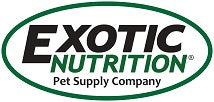What Skunks Shouldn't Eat: A Guide to Unsafe Foods
Skunks, with their curious nature and omnivorous diet, require careful consideration when it comes to what they eat. While these adorable creatures have a wide-ranging palate, there are certain foods that can be harmful to their health. In this guide, we'll explore the toxic and unhealthy foods that should be avoided when feeding your pet skunk, along with recommendations for safer alternatives, including Exotic Nutrition products.
Toxic Foods for Skunks
Toxic foods are those that contain substances harmful to skunks and can lead to serious health issues if ingested. It's crucial to keep these items away from your pet skunk at all costs:
-
Onions: Onions, whether raw, cooked, or powdered, contain compounds that can cause damage to a skunk's red blood cells, leading to anemia.
-
Chocolate: Chocolate contains theobromine, a compound that is toxic to skunks (as well as other pets like dogs and cats) and can lead to symptoms such as vomiting, diarrhea, rapid breathing, and even death.
-
Asparagus: While not commonly known, asparagus contains substances that may not be suitable for skunks and could lead to digestive issues.
-
Cat Food: While cat food is formulated for feline nutritional needs, it may not be suitable for skunks and could lead to imbalances in their diet.
-
Avocado Skin and Seeds: Avocado contains persin, a fungicidal toxin that can be harmful to skunks and cause symptoms like difficulty breathing and fluid accumulation in the chest.
-
Grapes: Grapes and raisins are known to cause kidney failure in dogs and may pose similar risks to skunks.
Unhealthy Foods for Skunks
While these foods may not be immediately toxic, they can still have adverse effects on a skunk's health if consumed regularly:
-
High-Fat Foods: Foods high in fat can lead to obesity and other health issues in skunks, just as they can in humans.
-
High-Sugar Foods: Like humans, skunks can suffer from dental issues, obesity, and diabetes if they consume too much sugar.
-
Processed Foods: Processed foods often contain additives and preservatives that may not be suitable for skunks and could lead to digestive upset.
-
Iceberg Lettuce: While lettuce itself isn't toxic, iceberg lettuce lacks nutritional value and can cause digestive issues if consumed in large quantities.
Safer Alternatives and Recommendations
When it comes to feeding your pet skunk, it's essential to provide a balanced diet that meets their nutritional needs. Exotic Nutrition offers several products specifically formulated for skunks and other small mammals, including:
-
Premium Skunk Diet 5 lb Skunk Food: This specially formulated skunk food provides essential nutrients to support your pet's health and well-being.
-
Premium Insectivore Diet Sugar Glider & Hedgehog Food: Skunks, like sugar gliders and hedgehogs, benefit from insect-based diets. This product offers a balanced mix of proteins and other nutrients.
-
Canned Insect Assortment: These canned insects provide a convenient and nutritious option for adding variety to your skunk's diet.
-
Fresh Feeders: Offering fresh, whole foods like fruits, vegetables, and lean meats can be a great way to provide additional nutrients and enrichment for your pet skunk.
Conclusion
While skunks are known for their adventurous eating habits, it's essential to be mindful of what they consume to ensure their health and well-being. By avoiding toxic and unhealthy foods and opting for safe alternatives like Exotic Nutrition products, you can help your pet skunk live a happy and healthy life. For more information on skunk diet and nutrition, be sure to check out our article on Skunk Diet.
Ready to Shop? Shop By Pet or Shop By Category
Got Questions? Browse more free Blogs or Contact Us with any inquiries regarding our products.
Notice: Exotic Nutrition cannot provide specific care guidelines on an individual basis. Please consult a veterinarian or experienced breeder.
Exotic Nutrition is proud to serve hundreds of universities, zoological parks, veterinarians, research centers and other institutions seeking to advance the health and well-being of exotics worldwide. See a full list of institutions using our products here.
Exotic Nutrition has a heart for animals in need. Through regular donations to rescues, rehabilitators, and special fundraiser events, Exotic Nutrition is making a significant impact in the lives of animals. See a full list of our charitable donations here.

Comments (1)
What do you mean cat food is toxic to skunks? That’s how I got my troublesome skunk – he found the cat’s food and now comes around every night looking for it. He’s eaten it several times we forgot to bring it in and he ain’t dead yet.
Leave a Comment